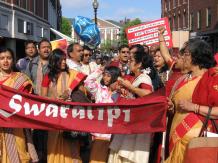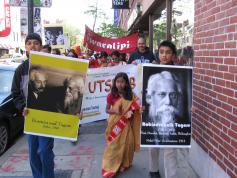Contribute
| Swaralipi Celebrates 150 Birthday Of Tagore At Harvard Square |
Ranjani Saigal
05/12/2011
Swaralipi organized a parade at Harvard Square on May 8th to commemorate the 150th birthday of Rabindranath Tagore. People in colorful dresses, holding large posters of Rabindranath, festoons, banners and colorful balloons started assembling in the arcade in front of the Harvard T station at around 3 pm. Soon the whole place took the look of a festival with scores of people singing Rabindrasangeet accompanied by harmonium, violin, Indian drum and flute. Women in pretty dresses started dancing to the beat of the songs. Scores of passersby stopped to enjoy music and dance and enquired about what this was about. A lady took a picture of the large rally and commented “I am so thankful to you that you are celebrating a poet in these violent timesâ€. The colorful parade with singing, dancing and music-playing went around Charles and JFK Streets and finished where it stared around 5.30 in the afternoon.
So what was the motivation for Swaralipi to do an event to honor Tagore at Harvard Square? “We feel that Rabindranath Tagore is the greatest cultural ambassador that India has ever produced. Most foreign dignitaries (including Obama) who visit India affirm his standing and copiously quote from his writing. In China, Japan and all over South America Tagore's work is included in text books. Thus we felt a need to bring his message to a wider audience. His 150 Birthday was the perfect excuse," says Rahul Ray who along with his wife Swapna Ray organized the event.
Why an unusual event like a parade? "People have been presenting his songs, dances (he wrote several ballets which are phenomenal) and sometimes plays. But, a parade in open daylight brings him to the public/foreigners that is our target. On Sunday several people enquired about him. Did you notice a young Caucasian man with a hat stayed the whole length? This is what we wanted to achieve,†says Ray.
Tagore had given lectures at Harvard nearly hundred years earlier. It was special to do it at spot where he probably stood at one time. The spot is also a very busy place and thus easy to attract the attention of a very eclectic mostly non-Indian crowd.
"There is a feeling that Tagore's influence in India is waning rapidly. Our successful parade proves that it is far from truth. But, a lot of work needs to be done. There is also a feeling that Tagore stood for Hindus only" - (due to his fascination with Vedas and Upnishads. RNT was also one of the first to translate Kabir's dohas). Nothing can be far from truth. He was a leader of Brahmo Samaj which believes in all religions. Presence of a large number of Bangladeshi muslims at the event debunks the religion-issue. Even Shajahan Khan (my son's friend) and his mother (from Lahore) came to the parade,†says Ray.
Ray also felt the parade debunked the myth that "Rabindranath is for Bengalis only".
“We were completely overwhelmed when Sekhar-ji (Shastri), Jagadish-ji (Mehta), his wife and sister started singing with us. We were completely bowled over when you (Ranjani Saigal) joined dancing spontaneously, and Anil Saigal (your husband) clapped in encouragement. Neeta Datta (Swapna's boss's wife) and her daughter stayed through the whole event. The crux of the matter is Tagore's work needs to be presented in a way that is palatable to everyone. I believe that we were wildly successful in doing that with our parade†said Ray.
The truth of this statement was reinforced by very special comment by Shekhar Shastri. “I am not sure when I learned Ekla Chalo. It was a part of my being. I was so honored when I was asked to sing for the 125th Birthday of Tagore on All India Radio. Tagore has always been very close to my heart,†says Shastri who knew so many of Tagore’s songs.
Standing there I was truly struck by the number of people who gathered around and took interest in the event. There was a young man from Saudi Arabia who enquired about Tagore and was curious to know more. Lokvani congratulates the Swaralipi team for creating a historic celebration in honor of a great Indian.
About Rabindranath Tagore and Swaralipi - By Rahul Ray
Rabindranath was born on May 7, 1861 in Calcutta (Kolkata), India to a very wealthy family of landowners and businessmen. His grandfather, Prince Dwarakanath Tagore was one of the wealthiest men in India in his times. In contrast, Rabindranath’s father Maharshi Debendranath Tagore turned inwards and became a sage. In his childhood and young-adult years Rabindranath moved from one school to another and ended up having no formal education or degree. But that didn’t dampen his genius. He first came to prominence as a poet when he published a collection of verses titled ‘Bhanusigher Padabali with a pen name Bhanusingha. These elegant verses were strongly influenced by Vaishnab poets, and written in a hybrid language of Bengali and Maithili manufactured by Rabindranath.
His pen never stopped after that, producing hundreds and thousands of verses and songs, numerous short stories, novels, plays, ballets and articles on spirituality to village economics. With his translations of some of his poems he became rapidly known in the West. In fact his fame attained a luminous height, taking him across continents on lecture tours and tours of friendship. His literary genius was recognized by the awarding the Nobel Prize in literature in 1913. For the world he became the voice of India's spiritual heritage; and for India, especially for Bengal, he became an institution.
Rabindranath was a myriad-minded man. He was a poet, a lyricist, a dramatist, an essayist, a musician-composer, a painter, philosopher and a statesman. He started painting at an age of almost seventy, and rapidly produced art-works which had no parallel in the world.
His new-wave paintings hung in the prestigious art galleries of Paris in his time. Today he is considered to be one leading Indian painters.
Rabindranath was a spiritual Universalist, and founded Viswabharati, a university with his own thought and ideals. Before the founding of this university Rabindranath went around the world trying to collect money. When his good friend Mohandas Karamchand Gandhi came to know about it, he scolded Rabindranath – ‘An artist of your stature should not be begging for money. It is my job. But under one condition, you should never reveal my identity.’ At this Rabindarnath bestowed him with the title Mahatma – a great soul, and Gandhi returned the favor by calling him Gurudev – supreme spiritual leader.
Viswabharati University in Shantiniketan became a magnet for world personalities like Romain Rolland, C.F. Andrews and many others. The University also produced future leaders of the world like Amartya Sen (Nobel prize winner in Economics), Indira Gandhi (Prime Minister of India) and Satyajit Ray (Oscar-winning film-maker). Rabindranath, with his scholarship and spiritual message strongly influenced people world over, like, André Gide, D.R. Bendre, Yasunari Kawabata, Gabriela Mistral, Pablo Neruda, Octavio Paz, many of whom went on to win Nobel Prize themselves.
Rabindranath was also the pioneer in the cooperative movement in India, which emanated from his interest in the social and political justice. It is no surprise that he was deeply involved in the freedom movement of India. Rabindranath is also credited to have written and composed national anthems for two countries (India and Bangladesh).
To a Bengali Rabindranath is known for his songs, a genre of Indian classical music, called Rabindrasangeet. Swaralipi is a music academy dedicated to propagate Rabindrasangeet among Americans of Indian origin, and whosoever interested. This academy is directed by Swapna Ray who is a disciple of late Suchitra Mitra, a doyen of Rabindrasangeet.
You may also access this article through our web-site http://www.lokvani.com/

